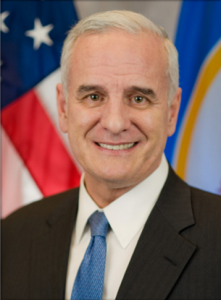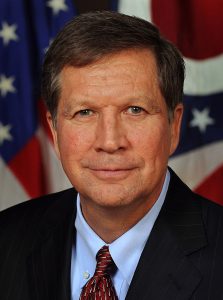
Minnesota Governor Mark Dayton has made clean water a priority during his tenure as governor and that focus continues as he enters the last two years of his second term.

Minnesota Governor Mark Dayton, courtesy of MN.gov
Dayton announced in early February that he set a goal of a 25 percent improvement in water quality in Minnesota by 2025.
The announcement was made in a speech to the Minnesota Environmental Congress where Dayton said he wants a collaborative approach to reach the goal based on a clean water ethic, not just regulations. He’ll use 2017 to travel the state and listen to input on ways to reach the goal.
The agricultural community will be a key player and the collaborative approach has farmers in mind.
In 2015, Dayton called out farmers on their pollution in a statement that was direct and put farmers on notice.
“You have a right to operate your land for lawful purposes, but you don’t have the right to dump your runoff … where the rest of Minnesotans want to enjoy it and where wildlife wants to enjoy it,” Dayton said.
The Democratic governor said farmers should “look into their souls” if it took government financial incentives – payments – so they would adopt non-polluting practices indicative of good environmental stewardship.
Dayton later was able to secure passage of a law that requires buffer strips in farm fields adjacent to streams. Buffer strips soak up nutrients like phosphorous that run off into waterways and fuel algae blooms.
Farmers didn’t like what they saw as a heavy-handed approach by Dayton to a problem they said they were already working on. They were able to soften the impact of the law when the requirement to have buffer strips near ditches was eliminated from the final legislation.
The agriculture community has been initially receptive to Dayton’s new collaborative approach. It potentially aligns with similar programs in Ohio, Michigan and Ontario related to Lake Erie.
Dayton isn’t the only governor in the Great Lakes region with water quality problems based on nutrient runoff from farms.

Ohio Governor John R. Kasich, courtesy of the Office of Ohio Governor
Lake Erie’s western basin has been the recipient of nutrient runoff from farms that have contributed to record algae blooms. But Ohio’s Governor John Kasich and the Ohio legislature have taken a softer approach than Dayton’s preferring to let farmers implement pollution reduction best practices on a voluntary basis.
Minnesota’s neighbor Iowa is home to a legal fight between agriculture interests and the Des Moines Water Works. The water works has sued county drain commissions alleging that once nutrient runoff enters drains, it becomes point source pollution and falls under the Clean Water Act. Nutrient runoff from farms is generally exempt from the act.
The water works spent $1.5 million in 2016 to remove nitrate from its drinking water. Agricultural interests insist they’re making progress in decreasing nutrient runoff with use of voluntary best practices.
If Dayton’s 2018 plan calls for more regulations on farmers, the federal government may have already put a damper on it.
President Donald Trump has announced that he’ll move to roll back regulations in general, and specifically at the U.S. Environmental Agency.

Zippy Duvall speaking to attendees at the FB Annual Convention
Scott Pruitt is the new EPA administrator and on his confirmation was the recipient of praise from American Farm Bureau president Zippy Duvall. In an EPA press release Duvall said Pruitt would bring a “breath of fresh air to the post.”
“For too long, farmers and ranchers have been victims of EPA’s harsh regulatory overreach” Duvall said. Duvall did not cite a specific example of regulatory overreach imposed on farmers.
An anti-regulatory attitude coming from the federal government could embolden farmers at the state level.
Dayton kicked off his information gathering meetings with a Water Quality Summit and will release his plan to meet the 2025 goal early next year.




